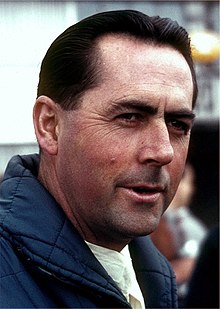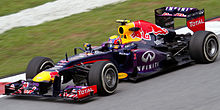Formula One drivers from Australia
 | |
| Drivers | 18 |
|---|---|
| Grands Prix | 749 |
| Entries | 862 |
| Starts | 833 |
| Best season finish | 1st (1959, 1960, 1966, 1980) |
| Wins | 43 |
| Podiums | 132 |
| Pole positions | 35 |
| Fastest laps | 62 |
| Points | 2973.5 |
| First entry | 1952 Belgian Grand Prix |
| First win | 1959 Monaco Grand Prix |
| Latest win | 2021 Italian Grand Prix |
| Latest entry | 2024 Chinese Grand Prix |
| 2024 drivers | Oscar Piastri Daniel Ricciardo |
There have been 18 Formula One drivers from Australia, 15 of which have taken part in at least one race since the championship began in 1950, and 3 failed to qualify. Two drivers have won the World Drivers' Championship: Jack Brabham, who won it three times, and Alan Jones, the most recent Australian world champion. Two drivers are currently active in the sport.
World champions and race winners[edit]

Two Australian drivers won the World Drivers' Championship, Jack Brabham in 1959, 1960, and 1966, and Alan Jones in 1980. Brabham is the only driver to win the title in one of their own cars, a Brabham in 1966. Twelve other Australian drivers have started a race with Mark Webber and Daniel Ricciardo being the only two to have won at least one grand prix.[1]
Current drivers[edit]

In 2011 Daniel Ricciardo became the first West Australian to race in Formula One.[2] He had joined Red Bull in 2009 as a test driver and was promoted to reserve driver for the following year. He was loaned to HRT in the second half of the 2011 season and joined Toro Rosso as a full-time driver in 2012.[3] After staying with Toro Rosso for 2013, Ricciardo moved to Red Bull Racing for 2014, where he stayed until the end of 2018, winning 7 races and achieving 29 podiums. He moved to Renault team for the 2019 season, and achieved 2 podiums with them at the 2020 Emilia Romagna and 2020 Eifel Grands Prix.[4] From 2021 to 2022 he drove for McLaren, giving the team their first win in 9 years with his victory at the 2021 Italian Grand Prix.[5] Although he had a contract to drive for the team in 2023, it was terminated during the 2022 championship by mutual agreement.[6] For 2023, he is acting as Red Bull Racing's third driver. He replaced Nyck de Vries at Scuderia AlphaTauri from the Hungarian Grand Prix onwards.

Oscar Piastri made his Formula One debut for McLaren at the 2023 Bahrain Grand Prix replacing fellow Australian driver Daniel Ricciardo.
Former drivers[edit]

Jack Brabham is the most successful Australian driver in history, having won three world titles.[1] He entered one grand prix in each of the 1955 and 1956 seasons, eventually becoming a full-time driver with Cooper. He finished on the podium in five of eight races in 1959, including two victories. That brought him his first title, which he retained the following year by winning five successive races. Regulation changes in 1961 saw a shake-up of teams and Cooper did not adapt; Brabham only finished two races. His knowledge of mechanics gave him the opportunity to set up his own outfit from 1961, and Brabham would become a significant team in F1. History was made in 1966 when Jack Brabham became the first person to win the title in a car bearing their name.[7]
Jack Brabham had three sons, two of whom went into Formula One.[1] David Brabham took part in two seasons – 1990 with Brabham and 1994 with Simtek – but only finished seven races with a best result of 10th.[8] Gary Brabham failed to qualify in two attempts during the 1990 season.[1]
Alan Jones entered Formula One in 1975 when Graham Hill's team brought him in to replace the injured Rolf Stommelen. He impressed enough to secure a full-time drive with Surtees but was not retained for a second season. He instead signed to the Shadow team after the death of their driver Tom Pryce and secured his first win at the 1977 Austrian Grand Prix. In 1978 he joined Williams for their first season with a purpose-built chassis, finishing just over half the races and standing on the podium once. His second year with the team brought considerable success and Jones won four races on his way to third in the championship.[9] He won the title in 1980, winning five races and featuring on the podium ten times,[9] thereby becoming the first world champion for Williams.[1] A difficult relationship with teammate Carlos Reutemann caused enough trouble within the team for Nelson Piquet to beat them both to the title in 1981 and Jones subsequently retired from Formula One. He made a one-off appearance for Arrows in 1983 but did not finish the race, then drove four races for Lola in 1985. He stayed with the team for the 1986 season but only finished five of the 16 races before retiring for good.[9]

Mark Webber three times finished third in the Drivers' Championship.[1][10] He began his career with Minardi in 2002 before a two-year stint with Jaguar. Offered the choice of driving for Williams or Renault, Webber opted for the former, a team with many previous successes. Renault, however, produced a championship-winning car for the next two seasons as Fernando Alonso won the 2005 and 2006 Drivers' titles. Webber only managed to finish 10th and 14th in the championship and soon returned to his previous team, now running under the name Red Bull. In his third season with the team (2009) Webber scored his maiden race wins at Nürburgring and Interlagos. The following year he came close to winning the title, losing it after a poor pit stop in the final race pushed him down to eighth place with teammate Sebastian Vettel taking that year's honour.[10] Webber remained with Red Bull for the next three years, finishing 3rd, 6th and 3rd in the championship.
Tim Schenken is one of only six Australian drivers to have stood on a podium step.[1] His Formula One career began in 1970 when Frank Williams gave him a contract.[11] He took part in four races for De Tomaso,[12] leaving at the end of the season to join Brabham alongside Graham Hill. He achieved his only podium finish at the 1971 Austrian Grand Prix and left the team at the end of the year because of his concern about the management ability of new Brabham boss Bernie Ecclestone.[11] However, his new drive with Surtees proved to be a bad move and he only managed to finish half of the twelve races he started.[11][12] He was then unable to secure a full-time drive and only started eight races over the next two seasons for three teams.[12]

Tony Gaze was the first Australian driver to compete in Formula One. A former World War II pilot with a dozen aerial victories, Gaze is considered to have been amongst the country's greatest flying aces.[1][13] He started three races in the 1952 but only finished one, coming in 14th.[13]
Other former drivers[edit]
Seven other drivers have competed in at least one race:
Two further drivers took part in at least one qualification session but did not start a race:
Timeline[edit]
| Drivers | Active Years | Entries | Wins | Podiums | Career Points | Poles | Fastest Laps | Championships |
|---|---|---|---|---|---|---|---|---|
| Tony Gaze | 1952 | 4 (3 starts) | 0 | 0 | 0 | 0 | 0 | - |
| Jack Brabham | 1955–1970 | 128 (126 starts) | 14 | 31 | 253 (261)[14] | 13 | 12 | 3 (1959, 1960, 1966) |
| Paul England | 1957 | 1 | 0 | 0 | 0 | 0 | 0 | - |
| Ken Kavanagh | 1958 | 2 (0 starts) | 0 | 0 | 0 | 0 | 0 | - |
| Frank Gardner | 1964–1965, 1968 | 9 (8 starts) | 0 | 0 | 0 | 0 | 0 | - |
| Paul Hawkins | 1965 | 3 | 0 | 0 | 0 | 0 | 0 | - |
| Tim Schenken | 1970–1974 | 36 (34 starts) | 0 | 1 | 7 | 0 | 0 | - |
| David Walker | 1971–1972 | 11 | 0 | 0 | 0 | 0 | 0 | - |
| Vern Schuppan | 1972, 1974–1975, 1977 | 13 (9 starts) | 0 | 0 | 0 | 0 | 0 | - |
| Larry Perkins | 1974, 1976–1977 | 15 (11 starts) | 0 | 0 | 0 | 0 | 0 | - |
| Alan Jones | 1975–1981, 1983, 1985–1986 | 117 (116 starts) | 12 | 24 | 199 (206)[14] | 6 | 13 | 1 (1980) |
| Warwick Brown | 1976 | 1 | 0 | 0 | 0 | 0 | 0 | - |
| Brian McGuire | 1977 | 1 (0 starts) | 0 | 0 | 0 | 0 | 0 | - |
| Gary Brabham | 1990 | 2 (0 starts) | 0 | 0 | 0 | 0 | 0 | - |
| David Brabham | 1990, 1994 | 30 (24 starts) | 0 | 0 | 0 | 0 | 0 | - |
| Mark Webber | 2002–2013 | 217 (215 starts) | 9 | 42 | 1047.5 | 13 | 19 | - |
| Daniel Ricciardo | 2011–2023 | 245 (244 starts) | 8 | 32 | 1317 | 3 | 16 | - |
| Oscar Piastri | 2023 | 27 (27 starts) | 0 | 2 | 135 | 0 | 2 | - |
| Source:[15] | ||||||||
See also[edit]
References[edit]
- ^ a b c d e f g h Black, Jacob (15 March 2012). "SPEED looks at Australia's Formula One history, after Daniel Ricciardo becomes the 14th Aussie driver in F1". FOX SPORTS Australia Pty Limited. Retrieved 22 September 2012.
- ^ Harris, Geoffrey (1 July 2011). "Ricciardo Australia's latest F1 driver". BackPageLead. Archived from the original on 28 November 2011. Retrieved 22 September 2012.
- ^ "Daniel Ricciardo". Formula One World Championship Limited. Retrieved 22 September 2012.
- ^ "Formula 1 - Press release - Daniel Ricciardo joins Renault Sport Formula One Team from 2019 - renaultsport.com". Renault Sport. Archived from the original on 3 August 2018. Retrieved 3 January 2020.
- ^ "McLaren swoop for Daniel Ricciardo as Carlos Sainz replacement for 2021". formula1.com. 14 May 2020. Retrieved 14 May 2020.
- ^ "Daniel Ricciardo to leave McLaren Racing at the end of 2022". McLaren. Archived from the original on 24 August 2022. Retrieved 24 August 2022.
- ^ "Jack Brabham". ESPN F1. ESPN EMEA Ltd. Retrieved 23 September 2012.
- ^ "David Brabham". ESPN F1. ESPN EMEA Ltd. Retrieved 23 September 2012.
- ^ a b c "Alan Jones". ESPN F1. ESPN EMEA Ltd. Retrieved 23 September 2012.
- ^ a b "Mark Webber". ESPN F1. ESPN EMEA Ltd. Retrieved 22 September 2012.
- ^ a b c "Drivers: Tim Shenken". GrandPrix.com. Inside F1, Inc. Retrieved 23 September 2012.
- ^ a b c "Tim Schenken". ESPN F1. ESPN EMEA Ltd. Retrieved 23 September 2012.
- ^ a b "Tony Gaze". ESPN F1. ESPN EMEA Ltd. Retrieved 22 September 2012.
- ^ a b Up until 1990, not all points scored by a driver contributed to their final World Championship tally (see list of points scoring systems for more information). Numbers without parentheses are Championship points; numbers in parentheses are total points scored.
- ^ "Australia - Grands Prix started • STATS F1". www.statsf1.com. Retrieved 6 February 2019.


